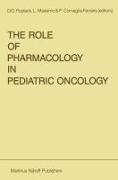The Role of Pharmacology in Pediatric Oncology
BücherAngebote / Angebote:
The dramatic improvement made in recent years in the treatment of child hood malignancies has been in large part the result of advances in the field of pharmacology. Chemotherapy is the major therapeutic modality used to treat childhood cancer. Rational administration of antineoplastic chemo therapy to the child with cancer requires the pediatric oncologist to have a thorough understanding of the fundamental principles of clinical pharmaco logy, an intimate knowledge of the specific agents being used, and an aware ness of the unique biologic and physiologic features of children. In mid 1985, a distinguished group of pediatric oncologists and clinical pharmacologists convened in a unique workshop to review the subject of pharmacology in pediatric oncology. A goal of this workshop was to pro duce a book which would review this topic and present it in a format useful for the clinician. In this book basic principles of pharmacology, mechanisms of drug resis tance, new methods of drug delivery, guidelines for studying new agents in children, new biological response modifiers and the pharmacology of the most commonly used chemotherapeutic agents in children are reviewed in depth. Particular emphasis is given to discussing those topics which unique ly apply to the use of antineoplastic agents in children with cancer. The Editors VII Contents Preface . v Contents Vll List of Major Contributors Xl Principles of Antineoplastic Therapy in Children 1. Clinical pharmacokinetics for the pediatric oncologist ................ .
Folgt in ca. 15 Arbeitstagen
